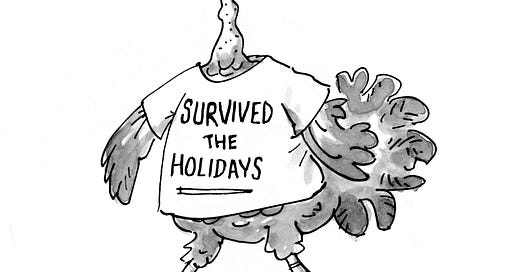Happy Thanksgiving! So What Are You Up to These Days?
On family time, career angst, and patience.
With apologies for the off-cycle missive, but perhaps a timely topic for Thanksgiving week...
Last month I wrote about family influence in career decision-making, and the holidays may be the time when family influence - or at least the feeling of family influence - becomes most concentrated.
Outside of normal routines, frequently at home or in familiar places, the holidays tend to create opportunities for reflection and conversation. What’s changed since I was last here? What’s the same? What have I accomplished? What have I yet to accomplish?
The conversation that comes up about work/career - what you’re up to these days!? - can often breed feelings of dread, inadequacy, or shame, especially if you don’t feel like you have a conversation-worthy answer, you’re in a time of transition, or things haven’t exactly panned out as you hoped or planned.
And for some reason when we are most uncertain seems to be when we get the hardest to answer questions, when we feel least equipped to answer in satisfying ways, and when we’re least interested in digging into the ambiguity of it all over hors d'oeuvres.
Unfortunately, times of transition and uncertainty are also when parents and siblings and aunts and uncles and cousins and friends are most curious about what you’re up to.
I suspect the anxiety that leaches into these conversations is driven by a few things:
Fear of values conflict (real or perceived):
What I want to do may simply not be what my [family member] wants for me.
I’m doing something that’s meaningful to me, but my [family member] may not understand it or see it that way.
Bad communication:
I, or my [family member], may not be listening to understand, but just trying to deliver a message.
I’m responding to questions out of a perceived need to defend myself.
Identity questioning:
I may be doing something for now that’s not in-line with how I see myself, so talking about it feels like I’m lying about something important.
I may have a job that simply creates the flexibility or financial security I want, and talking about it isn’t something that interests me or brings you joy, but the topic of conversation always comes up anyway.
I’m a full-time parent, which makes it so much harder to hang a piece of my identity on my work.
In fact, research on patterns in family communication suggests that two key dimensions - conversation orientation and conformity orientation - can describe how conflict tends to play out in families.
Conversation orientation refers to how open and supportive communication tends to be in a family system, and conformity orientation refers to how much the family system tends to emphasize consistency in values, attitudes, and beliefs.
Imagining where your family falls on each of these continuums (continua?…) may provide a bit of insight into why conflict always pops up around certain issues that are especially values/identity laden.
Ultimately, I think most of the challenge in these career conversations - outside the general stress that can accompany the holidays - is the seed of uncertainty at the center.
And oh boy can that uncertainty mount around family. Even family that is open and supportive, because the questions still come and it’s the questions themselves that fuel anxiety by pointing to the questions you likely already ask (and struggle to answer) of yourself.
As I’ve said before, a career is something that can only be understood backwards, but it must be lived forwards. It can only really be made sense of in retrospect, which means ambiguous, hard to answer questions will invariably be a feature of your career (and indeed your life).
Personally, I think a useful answer to “what are you up to?” if you don’t feel like you have an easy answer to that question is something like: “Right now I’m doing X, but mostly I’m taking my time and trying to be patient while I figure it out.” And not patient in the abstract, but patient in the way Tolstoy describes it:
“Patience is waiting. Not passively waiting. That is laziness. But to keep going when the going is hard and slow - that is patience. The two most powerful warriors are patience and time.”
Happy Thanksgiving all, and cheers to hopeful and helpful conversations over the holidays :)
Apply this thinking
If you’re anxious about holiday conversations, this NYTimes article has some helpful ideas - and links to other articles - on managing conflict specifically.
When I teach workshops on giving feedback and coach people on how to do so when the stakes are high, the main point I try to leave them with is to prepare. It can be really hard to wing emotionally laden conversations precisely because it can be hard to manage emotions in the moment. Having a plan can help, both in terms of what you aim to communicate, and how you aim to respond to less than helpful commentary.





